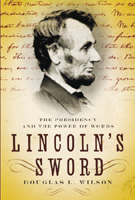home | metro silicon valley index | the arts | books | review

Lincoln's Sword: The Presidency and the Power of Words
(By Douglas L. Wilson; Knopf; 343 pages; $26.95 cloth)
Reading Douglas L. Wilson's compact (Gary Wills wrote an entire book just about the Gettysburg Address) analysis of Abraham Lincoln's prose powers, it is hard not to observe how far we have fallen. Could George W. Bush even conceive, much less express, this profound sentiment: "I hate it [slavery] because it deprives our republican example of its just influence in the world—enables the enemies of free institutions, with plausibility, to taunt us as hypocrites—causes the real friends of freedom to doubt our sincerity ..." Substitute "torture" or "extraordinary rendition" to see an essential point that still resonates. Wilson, working from manuscripts, examines some of Lincoln's most famous writings—his first and second inaugural addresses, the Emancipation Proclamation, Gettysburg—to show how shrewdly the self-educated pol framed his thoughts for maximum impact. Lincoln constantly jotted down stray thoughts on scraps of papers, then assembled ("cut and paste" in word-processor language) them into drafts that he restlessly and repeatedly revised. Aware of his critics' complaint that he was too folksy, even downright crude, Lincoln knew how to mix high rhetoric with plain talk so that all could understand and follow his arguments. A practiced debater, he pursued both sides of arguments in order to strengthen his own conclusions. He spent much time honing his cadenced use of antithesis and alliteration ("little note nor long remember") until his prose morphed into civic poetry. Although his long-suffering printer, John D. Defrees, claimed that the president "knew nothing of the rules of punctuation," Lincoln, as Wilson demonstrates, consciously used commas to signal pauses for his spoken delivery, rather than as grammatical markers. Lincoln's Sword culminates with the remarkable second inaugural address, in which Lincoln achieved the status of a prophet with his "vexing and unwelcome supposition—that the war was a punishment for the offense of slavery, an offense for which both sides ... were to blame and to whom punishment was therefore due." I doubt if such soul-searching will result from the Baker Commission report.
Review by Michael S. Gant
Send a letter to the editor about this story.
|
|
|
|
|
|